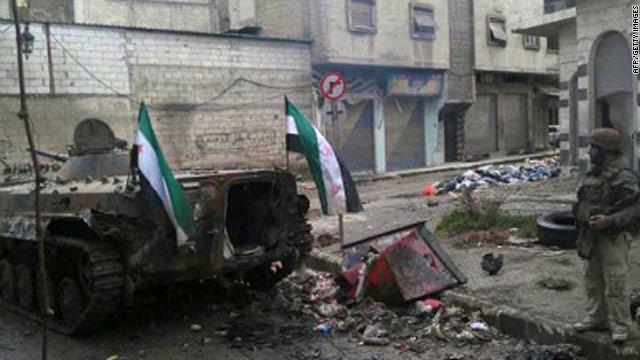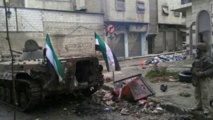Guarded by troops, the school houses rebels and some activists who left Homs' besieged Old City neighbourhood, broken by hunger and lured by government promises of amnesty if they surrendered.
The regime says it wants to "re-educate" the men, who include army defectors, draft evaders and civilians who joined the revolt against President Bashar al-Assad that broke out in March 2011.
But those who surrendered have been labelled as "traitors" by their former comrades in arms.
The majority of the 1,500 people who passed through Al-Andalus were given release papers by the authorities. Some are still waiting to be freed, while others are refusing to leave.
Detainees told AFP during a visit to the facility authorised by the Homs governor that at least 56 were re-arrested after their release or simply vanished.
Many now fear they could face the same fate.
'Enforced disappearances'
"My brother was arrested after he was given his papers, and now we don't know where he is," said Mwaffaq Shufan, an ex-rebel commander held at Al-Andalus.
"We thought we were getting an amnesty, but our names have been given to the security services, and people like my brother have been arrested upon their release."
The detainees say they were tricked into surrendering and dozens who received release papers have chosen to stay on, fearing they could be re-arrested or abducted by pro-regime militiamen.
Among the disappeared is Khaled al-Tellawy, a well-known media activist who had covered the uprising in Homs since its outbreak.
"He was released a month ago, but then he was referred to the military prosecution. We don't know where he is any more," said Ghanem, a detainee who declined to give his surname.
He said Tellawy had "admitted" providing video footage and pictures to international media.
"What else do they (the regime) want? I don't dare leave," he added.
Neil Sammonds of Amnesty International said Al-Andalus detainees face a "high risk of enforced disappearances, and the safeguards for them are clearly inadequate".
Rami Abdel Rahman, who heads the Syrian Observatory for Human Rights monitoring group, said it was likely the names of freed detainees would be leaked to "pro-regime militias who are suspected of carrying out abductions".
'Reintegration into society'
Al-Andalus director Ammar Heshme said 20 men were arrested and referred to prosecution after they had left the facility because civilians had launched proceedings against them.
"There are citizens who accuse them of having kidnapped a relative or killed another. The government can pardon them but it cannot stop these citizens from filing complaints against them," he said.
Heshme added some detainees were arrested after their release "because they tried to leave the country illegally".
The men being held in Al-Andalus appeared in relative good health, were allowed cell phones and visits from clerics and academics, who Heshme said help show them "the right track".
They are allowed visitors but detainees said their relatives risk kidnapping if they come.
"My cousins were coming to see me but they disappeared. I am afraid of being kidnapped too," said Firas, who also did not give his surname.
"Most of my relatives are in Waer (the last rebel-held district of Homs). If I go there, I fear the rebels might retaliate against me, as they consider us traitors," he said.
Firas surrendered in early May under a deal he and other detainees struck with the army.
Another detainee who identified himself as Ziad said he surrendered because after the army's two-year siege, he was weak from hunger.
"I could not stand on my own two feet anymore," he said.
Others said they could no longer bow to demands by rebel chiefs who asked them for loyalty in exchange for food and medicines.
Shufan, the rebel commander, said detainees complained they had nowhere left to turn.
"We are victims of the two sides," he said.
-------------------------------------------------------------
The regime says it wants to "re-educate" the men, who include army defectors, draft evaders and civilians who joined the revolt against President Bashar al-Assad that broke out in March 2011.
But those who surrendered have been labelled as "traitors" by their former comrades in arms.
The majority of the 1,500 people who passed through Al-Andalus were given release papers by the authorities. Some are still waiting to be freed, while others are refusing to leave.
Detainees told AFP during a visit to the facility authorised by the Homs governor that at least 56 were re-arrested after their release or simply vanished.
Many now fear they could face the same fate.
'Enforced disappearances'
"My brother was arrested after he was given his papers, and now we don't know where he is," said Mwaffaq Shufan, an ex-rebel commander held at Al-Andalus.
"We thought we were getting an amnesty, but our names have been given to the security services, and people like my brother have been arrested upon their release."
The detainees say they were tricked into surrendering and dozens who received release papers have chosen to stay on, fearing they could be re-arrested or abducted by pro-regime militiamen.
Among the disappeared is Khaled al-Tellawy, a well-known media activist who had covered the uprising in Homs since its outbreak.
"He was released a month ago, but then he was referred to the military prosecution. We don't know where he is any more," said Ghanem, a detainee who declined to give his surname.
He said Tellawy had "admitted" providing video footage and pictures to international media.
"What else do they (the regime) want? I don't dare leave," he added.
Neil Sammonds of Amnesty International said Al-Andalus detainees face a "high risk of enforced disappearances, and the safeguards for them are clearly inadequate".
Rami Abdel Rahman, who heads the Syrian Observatory for Human Rights monitoring group, said it was likely the names of freed detainees would be leaked to "pro-regime militias who are suspected of carrying out abductions".
'Reintegration into society'
Al-Andalus director Ammar Heshme said 20 men were arrested and referred to prosecution after they had left the facility because civilians had launched proceedings against them.
"There are citizens who accuse them of having kidnapped a relative or killed another. The government can pardon them but it cannot stop these citizens from filing complaints against them," he said.
Heshme added some detainees were arrested after their release "because they tried to leave the country illegally".
The men being held in Al-Andalus appeared in relative good health, were allowed cell phones and visits from clerics and academics, who Heshme said help show them "the right track".
They are allowed visitors but detainees said their relatives risk kidnapping if they come.
"My cousins were coming to see me but they disappeared. I am afraid of being kidnapped too," said Firas, who also did not give his surname.
"Most of my relatives are in Waer (the last rebel-held district of Homs). If I go there, I fear the rebels might retaliate against me, as they consider us traitors," he said.
Firas surrendered in early May under a deal he and other detainees struck with the army.
Another detainee who identified himself as Ziad said he surrendered because after the army's two-year siege, he was weak from hunger.
"I could not stand on my own two feet anymore," he said.
Others said they could no longer bow to demands by rebel chiefs who asked them for loyalty in exchange for food and medicines.
Shufan, the rebel commander, said detainees complained they had nowhere left to turn.
"We are victims of the two sides," he said.
-------------------------------------------------------------









 Home
Home Politics
Politics











